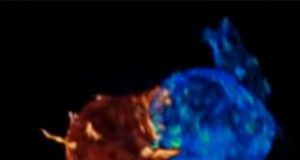June 20, 2017 (Medical News Today)
Immunotherapy drugs continue to only be effective in about 10 to 30 percent of cancer patients with certain tumor types.
A clue has been discovered, however, by researchers at the University of Pittsburgh School of Medicine and UPMC, that may hold the secret for immunotherapy drugs to effectively treat more cancers.
Targeting certain immune cells, called regulatory T cells (Tregs; pronounced “tee-regs”), could be an effective approach to treating more cancers. Explained by Dario Vignali, Ph.D, Tregs “act like a dimmer switch, keeping the lights bright enough to detect and eliminate threats, but not so bright that our own cells are hurt.”
When it comes to cancer, Tregs can be lethal because they prevent the immune system from finding and killing cancer cells. And developing a drug to eliminate Tregs would only be detrimental to patients because such a drug may lead to dangerous autoimmune complications.
A few years ago, Vignali and his team discovered that almost all Tregs that had penetrated mouse tumors expressed a surface protein called neuropilin-1 (Nrp1). They found that Nrp1 expression was required to “maintain the function, integrity, and survival of Tregs within the harsh tumor microenvironment,” meaning that Nrp1 on Tregs helped the tumor(s) survive. Also, blocking or deleting Nrp1 in Tregs only affected their function in the tumor and not the rest of the body.
The findings of Vignali’s teams’ current study using a “genetically modified mouse model”:
1. Nrp1 expressed on Tregs prevent the immune system from helping to kill tumors in mice.
2. Tregs that do not express Npr1 suppress and aid in anti-tumor immune response.
3. In cancer in patients who did not have a good outlook, Nrp1-expressing Treg subset was much higher, meaning that these findings may apply to humans as well.
In this study, a dramatic reduction of tumor growth was seen when the Npr1 protein was deleted from half of the Tregs.
Reports uncovered a “secreted immune molecule” called interferon-gamma (IFNγ). This molecule is a key finding because it is capable of preventing the “dimmer” switch function of Tregs, specifically their functions in the tumor microenvironment. IFNγ also seems to make Tregs weak and in doing so, may make for a more-effective immunotherapy.






